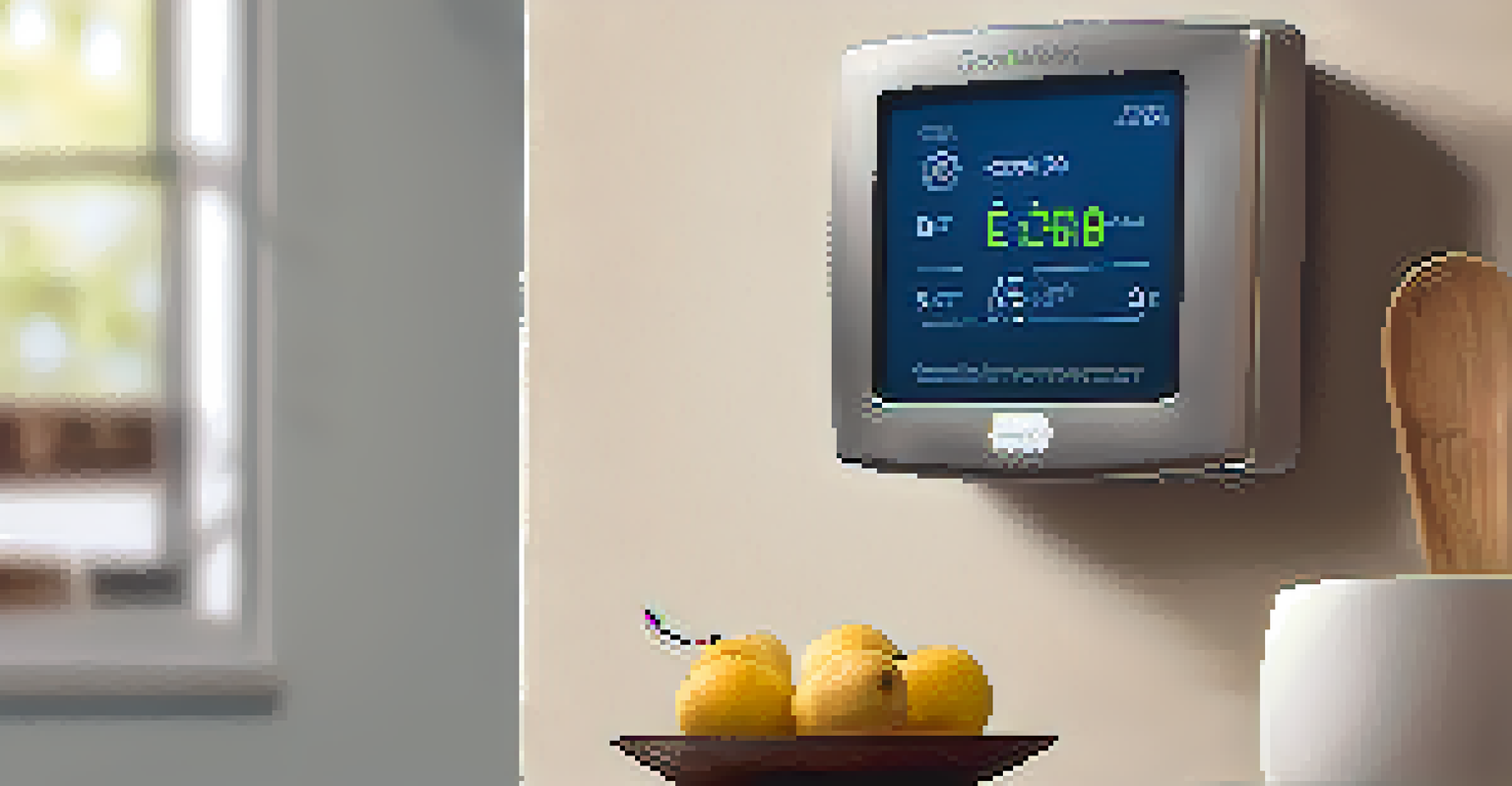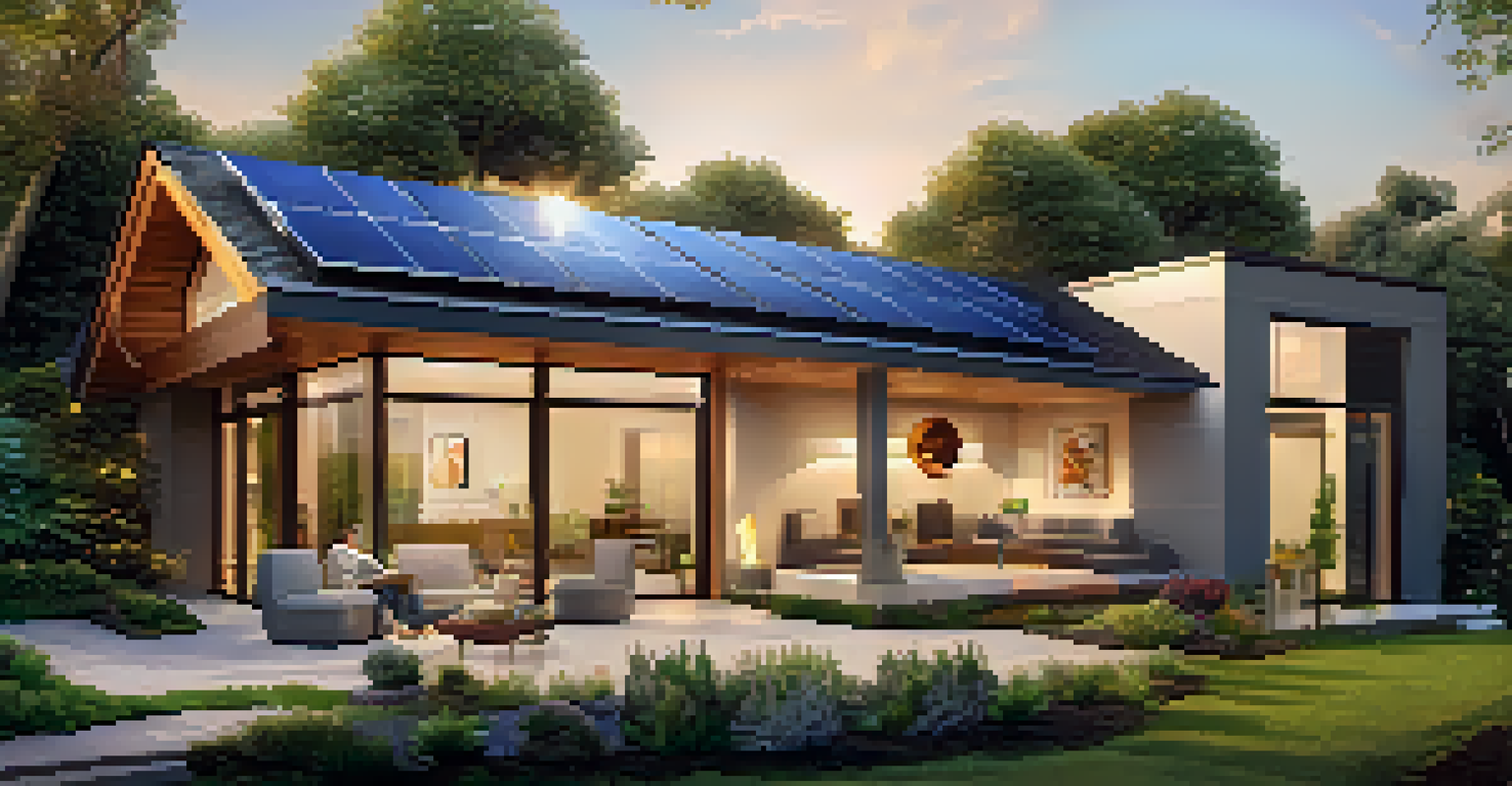Harnessing Smart Technology for Energy Savings

Understanding Smart Technology in Energy Management
Smart technology refers to devices or systems that can communicate, analyze data, and automate processes, making them essential for modern energy management. By leveraging these tools, households and businesses can monitor and control their energy usage in real-time, leading to more informed decisions. For instance, smart thermostats learn your heating and cooling preferences, optimizing energy consumption without sacrificing comfort.
The greatest threat to our planet is the belief that someone else will save it.
The integration of smart technology into energy management goes beyond mere convenience. It allows users to identify patterns in their energy usage, highlighting areas where savings can be made. For example, a smart home system can alert you when energy usage spikes unexpectedly, encouraging you to take action to reduce waste.
Ultimately, understanding how smart technology works lays the foundation for implementing effective energy-saving strategies. With the right tools at your disposal, you'll find that managing energy consumption becomes more intuitive and less of a chore.
The Role of Smart Meters in Energy Conservation
Smart meters are a cornerstone of energy savings, providing real-time data on your energy consumption. Unlike traditional meters that only report usage monthly, smart meters give you instantaneous feedback, which can significantly change your habits. Imagine knowing exactly how much energy your appliances consume at any moment; this visibility allows for smarter decisions.

In addition to monitoring usage, smart meters often come equipped with tools to help analyze your consumption patterns. This analysis can reveal high-usage times, enabling you to adjust your energy-intensive tasks to off-peak hours, often when rates are lower. For example, running your dishwasher or laundry machine late at night can lead to substantial savings over time.
Smart Tech Enhances Energy Management
Smart technology enables real-time monitoring and control of energy usage, leading to better decision-making for savings.
Furthermore, smart meters can facilitate better communication with your utility provider, allowing for more accurate billing and potential participation in demand-response programs. These programs reward you for reducing your energy use during peak demand, adding another layer of savings.
Optimizing HVAC Systems with Smart Technology
Heating, ventilation, and air conditioning (HVAC) systems account for a large portion of energy consumption in homes and businesses. Smart technology can optimize these systems by adjusting settings based on occupancy and preferences. For instance, smart thermostats can detect when you are home or away, adjusting the temperature accordingly to save energy.
Energy efficiency is not just a way to save money, it's a way to save the planet.
Moreover, integrating smart sensors into your HVAC system can enhance efficiency. These sensors can monitor air quality and humidity levels, ensuring that your system operates only when necessary. This not only conserves energy but also improves indoor air quality, making your environment healthier.
By utilizing smart technology to manage HVAC systems, you can significantly reduce energy costs while maintaining comfort. It's a win-win situation that highlights how innovation can lead to practical solutions in everyday life.
Smart Lighting Solutions for Energy Efficiency
Lighting is another area where smart technology can make a big impact on energy savings. Smart bulbs and lighting systems allow you to control your lights remotely, set schedules, and even adjust brightness based on natural light levels. Imagine coming home to a well-lit house without having to leave the lights on all day—smart lighting makes this possible.
Additionally, smart lighting can be integrated with motion sensors to ensure that lights are only on when needed. This can be particularly effective in rooms that are not frequently used, such as storage areas or bathrooms, where lights can automatically turn off when no motion is detected. This simple adjustment can lead to noticeable reductions in energy consumption.
Smart Meters Drive Energy Awareness
Smart meters provide instantaneous feedback on energy consumption, helping users adjust habits for optimal savings.
With smart lighting, you also have the flexibility to customize your ambiance while saving energy. For example, you can set different lighting scenes for various activities, ensuring you use only what you need, when you need it.
Energy-Efficient Appliances: The Smart Choice
Investing in energy-efficient appliances equipped with smart technology is a smart way to cut down on energy costs. These appliances often come with features such as energy usage tracking, remote control, and scheduling capabilities. For instance, a smart refrigerator can alert you when the door is left ajar, preventing unnecessary energy waste.
Beyond just convenience, energy-efficient appliances are designed to use less energy without compromising performance. Many smart appliances are rated highly for their efficiency, which translates to lower utility bills over time. For example, a smart washing machine can optimize water and energy use based on the load size, ensuring that you’re not using more than necessary.
By choosing smart appliances, you're not just making a purchase; you're making an investment in long-term energy savings and sustainability. This choice not only benefits your wallet but also contributes positively to the environment.
Home Automation: A Comprehensive Energy-Saving Strategy
Home automation systems can tie together various smart technologies to create a cohesive energy-saving strategy. By integrating devices like smart thermostats, lighting, and appliances, you can create customized settings that optimize energy use throughout your home. For instance, setting a 'sleep' mode can adjust multiple devices at once, reducing energy usage while you rest.
Automation also allows for remote management, meaning you can adjust settings even when you're not home. This flexibility can be especially beneficial during vacations or unexpected delays, where you can ensure that energy isn't wasted. Imagine being able to turn off the lights or adjust the thermostat from your smartphone, adding a layer of convenience to energy management.
Home Automation Maximizes Efficiency
Integrating smart devices through home automation creates a comprehensive energy-saving strategy tailored to individual needs.
Ultimately, home automation empowers you to take control of your energy consumption in a way that was previously unimaginable. By seamlessly integrating various technologies, you can ensure that your home operates efficiently and sustainably.
The Future of Smart Technology in Energy Savings
As technology continues to evolve, the potential for energy savings through smart devices only grows. Innovations like artificial intelligence and machine learning are opening up new avenues for optimizing energy use. For example, AI can analyze your energy patterns and make real-time adjustments to maximize efficiency, saving you money and reducing your carbon footprint.
Moreover, the growing popularity of renewable energy sources, such as solar panels, can be enhanced with smart technology. These systems can monitor energy production and consumption, ensuring that you make the most of the clean energy generated. Imagine a home that not only saves energy but also produces it—this is becoming increasingly feasible with smart tech.

In conclusion, the future of smart technology in energy savings holds exciting possibilities. By embracing these advancements, we can create a more sustainable world while enjoying the benefits of lower energy costs.